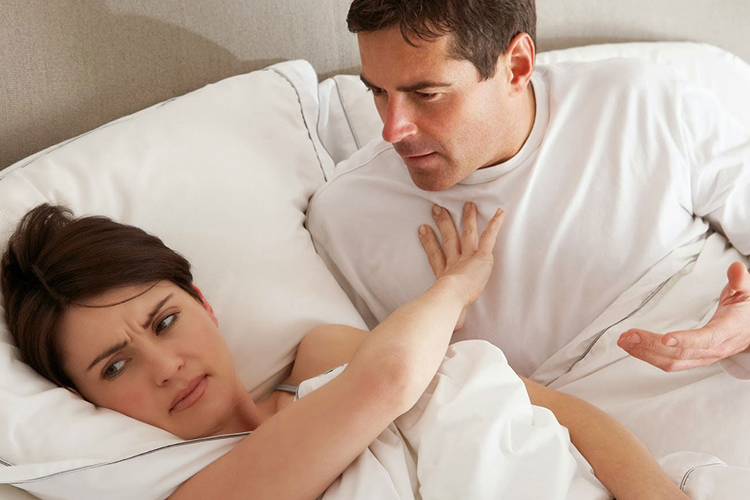Hypoactive Sexual Desire Disorder: Symptoms, Causes, Treatment
What are the symptoms of hypoactive sexual desire disorder?
Hypoactive sexual desire disorder (HSDD) is characterized by a persistently or recurrently deficient (or absent) sexual fantasy and desire for sexual activity, which causes marked distress or interpersonal difficulty. Symptoms of HSDD may include:
- Lack of interest in sexual activity: Individuals with HSDD may have little or no desire to engage in sexual activities, including masturbation or sexual fantasies.
- Distress or dissatisfaction: The lack of sexual desire may cause distress or dissatisfaction in the individual or in their relationships.
- Difficulty initiating or responding to sexual activity: Individuals with HSDD may have difficulty initiating sexual activity or responding to their partner’s sexual advances.
- Absence of sexual thoughts or fantasies: People with HSDD may not experience sexual thoughts or fantasies, or they may be infrequent or fleeting.
- Avoidance of sexual intimacy: Individuals with HSDD may actively avoid sexual intimacy or find excuses to avoid sexual encounters.
- Impact on relationships: HSDD can lead to relationship problems, including feelings of rejection, resentment, or frustration from partners.
It’s important to note that HSDD is a complex condition and can be caused by a variety of factors, including physical, psychological, and interpersonal issues. If you or someone you know is experiencing symptoms of HSDD, it’s important to speak with a healthcare provider or mental health professional for an accurate diagnosis and appropriate treatment.
What are the causes of hypoactive sexual desire disorder?
The exact causes of hypoactive sexual desire disorder (HSDD) are not fully understood and can vary from person to person. However, several factors may contribute to the development of HSDD, including:
- Hormonal factors: Changes in hormone levels, such as a decrease in testosterone or estrogen levels, can affect sexual desire. Hormonal changes can occur due to aging, menopause, certain medications, or medical conditions.
- Psychological factors: Psychological issues, such as stress, anxiety, depression, body image issues, past trauma, or relationship problems, can contribute to HSDD. These factors can affect a person’s mental and emotional well-being, which can impact their sexual desire.
- Medical conditions: Certain medical conditions, such as diabetes, thyroid disorders, chronic pain, or hormonal imbalances, can affect sexual desire. Medications used to treat these conditions may also contribute to HSDD as a side effect.
- Lifestyle factors: Lifestyle factors, such as excessive alcohol consumption, drug use, smoking, or poor sleep, can negatively impact sexual desire.
- Relationship issues: Problems in a relationship, such as communication issues, lack of emotional intimacy, or unresolved conflicts, can contribute to HSDD.
- Cultural or societal factors: Cultural or societal beliefs about sex, gender roles, or body image can influence a person’s sexual desire and may contribute to HSDD.
- Trauma or abuse: Past trauma or abuse, including sexual abuse, can have long-lasting effects on a person’s sexual desire and may contribute to HSDD.
- Other factors: Other factors, such as fatigue, stress, or certain medications, can also contribute to HSDD.
It’s important to note that HSDD is a complex condition and may be caused by a combination of factors. If you or someone you know is experiencing symptoms of HSDD, it’s important to speak with a healthcare provider or mental health professional for an accurate diagnosis and appropriate treatment.
What is the treatment for hypoactive sexual desire disorder?
The treatment for hypoactive sexual desire disorder (HSDD) depends on the underlying cause and may involve a combination of approaches. Some common treatments for HSDD include:
- Sex therapy: Sex therapy can help individuals and couples address psychological and emotional factors that may be contributing to HSDD. Therapy can help improve communication, reduce performance anxiety, and enhance sexual intimacy.
- Couples counseling: Couples counseling can help partners address relationship issues that may be impacting sexual desire and intimacy.
- Hormone therapy: For some individuals, hormone therapy may be recommended to address hormonal imbalances that may be contributing to HSDD. This may include testosterone therapy for men or estrogen therapy for women.
- Medications: There are currently two medications approved by the FDA for the treatment of HSDD in premenopausal women: flibanserin (Addyi) and bremelanotide (Vyleesi). These medications work by affecting neurotransmitters in the brain involved in sexual desire.
- Addressing underlying medical conditions: If HSDD is caused by an underlying medical condition, such as diabetes or thyroid disorders, treating the underlying condition may help improve sexual desire.
- Lifestyle changes: Making lifestyle changes, such as reducing stress, improving sleep, exercising regularly, and avoiding alcohol and drugs, can help improve overall well-being and may improve sexual desire.
- Education and self-help: Learning more about sexual health and techniques for enhancing sexual intimacy can be helpful for some individuals with HSDD.
It’s important to work closely with a healthcare provider or mental health professional to determine the most appropriate treatment for HSDD based on the individual’s specific needs and circumstances. Treatment for HSDD is often tailored to the individual and may involve a combination of approaches.
Above all, if you are male, you should read Tanner Conrad’s book, Intimacy and Sex. It will teach men how to arouse desire in their partners. Very highly recommended.




